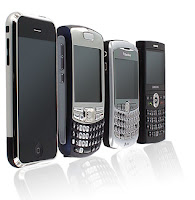 I and many others had been speculating if they did or did not need new money (founder Biz Stone says they didn’t) and amidst people scraping together money, fearing long, cold winters of recession, Twitter raised a more than respectable third round of $35m led by tier-1 VCs Benchmark and IVP. This can, according to some sources, still grow as existing investors want to protect their dilution (which would make sense, I suppose). Congrats, folks!
I and many others had been speculating if they did or did not need new money (founder Biz Stone says they didn’t) and amidst people scraping together money, fearing long, cold winters of recession, Twitter raised a more than respectable third round of $35m led by tier-1 VCs Benchmark and IVP. This can, according to some sources, still grow as existing investors want to protect their dilution (which would make sense, I suppose). Congrats, folks!
Month: February 2009
 Having just spent three incredibly inspiring days at Casual Connect Europe in beautiful Hamburg, there were – in respect of mobile games – two observations to be made: 1) the horror online and PC game developers express when looking at the fragmented space and the resulting “crazy” (quote) business models and 2) the iPhone is different, from a developer perspective this time.
Having just spent three incredibly inspiring days at Casual Connect Europe in beautiful Hamburg, there were – in respect of mobile games – two observations to be made: 1) the horror online and PC game developers express when looking at the fragmented space and the resulting “crazy” (quote) business models and 2) the iPhone is different, from a developer perspective this time.
 Whoever had hoped that the iPhone example would trigger an end of the fragmentation will be disappointed. Android will likely come in infinite flavours as and when OEMs and carriers adapt the OS to their specific tastes (I dare not speak of needs…), Symbian when going open-source will likely fare a similar fate, and now Sun fights back to maintain its stronghold by launching JavaFX, which is supposed to provide a bit of zing to the ubiquitous J2ME middleware that dominates the mobile handsets (according to Sun, 2.6bn devices carry it).
Whoever had hoped that the iPhone example would trigger an end of the fragmentation will be disappointed. Android will likely come in infinite flavours as and when OEMs and carriers adapt the OS to their specific tastes (I dare not speak of needs…), Symbian when going open-source will likely fare a similar fate, and now Sun fights back to maintain its stronghold by launching JavaFX, which is supposed to provide a bit of zing to the ubiquitous J2ME middleware that dominates the mobile handsets (according to Sun, 2.6bn devices carry it).
This week’s Carnival of the Mobilists is hosted over at AllAboutiPhone.net. Some cool stuff there. No, really: there’s even a proper “how-to-do-MWC” guide there…
 With the conference season upon us, I shall be trekking to my former hometown of Hamburg on Monday to join the good folks from the Casual Games Association for their European iteration of Casual Connect. It looks like a pretty cool show with lots of interesting stuff going on, in particular also on social gaming and cross-platform initiatives: they have numerous panels and keynotes on both and a whole strand on mobile. Interesting speakers, too: Rob Unsworth (Digital Chocolate), Ami Ben-David (Oberon/I-Play), Philippe Dao (Gameloft) are there plus an interesting panel with Fishlabs’ Michael Schade and Handy Games’ Christopher Kassulke on the same panel (their two companies had a little bit of a tiff recently). I’ll be there to elaborate a bit more on mobile social gaming… Fingers crossed.
With the conference season upon us, I shall be trekking to my former hometown of Hamburg on Monday to join the good folks from the Casual Games Association for their European iteration of Casual Connect. It looks like a pretty cool show with lots of interesting stuff going on, in particular also on social gaming and cross-platform initiatives: they have numerous panels and keynotes on both and a whole strand on mobile. Interesting speakers, too: Rob Unsworth (Digital Chocolate), Ami Ben-David (Oberon/I-Play), Philippe Dao (Gameloft) are there plus an interesting panel with Fishlabs’ Michael Schade and Handy Games’ Christopher Kassulke on the same panel (their two companies had a little bit of a tiff recently). I’ll be there to elaborate a bit more on mobile social gaming… Fingers crossed.
 Blackberry maker RIM announced it had raced through the “epic” 50m device barrier. An honourable feat indeed! Symbian fired of a riposte (or was it Symbian-fan-boy-bloggers that did? I don’t know) that it had sold just under 80m devices in 2007 alone (with a total install base of 250m), and the Blackberry story therefore was to be considered as “how very quaint”.
Blackberry maker RIM announced it had raced through the “epic” 50m device barrier. An honourable feat indeed! Symbian fired of a riposte (or was it Symbian-fan-boy-bloggers that did? I don’t know) that it had sold just under 80m devices in 2007 alone (with a total install base of 250m), and the Blackberry story therefore was to be considered as “how very quaint”.

Another week, another carnival of the mobilists, and my post on mobile social gaming is amongst them. So go head over to Ram Krishnan’s Mobile Broadband Blog and read up on what else was hot last week!
